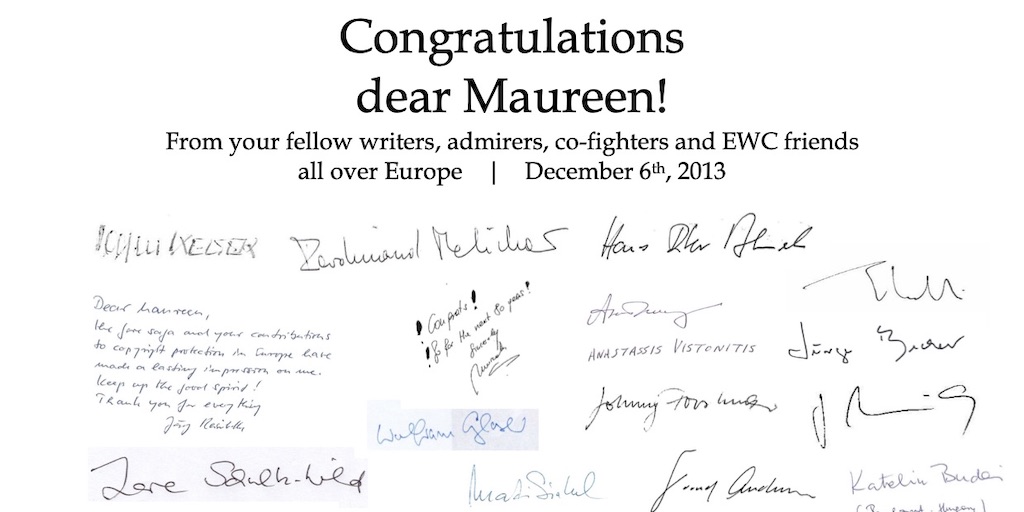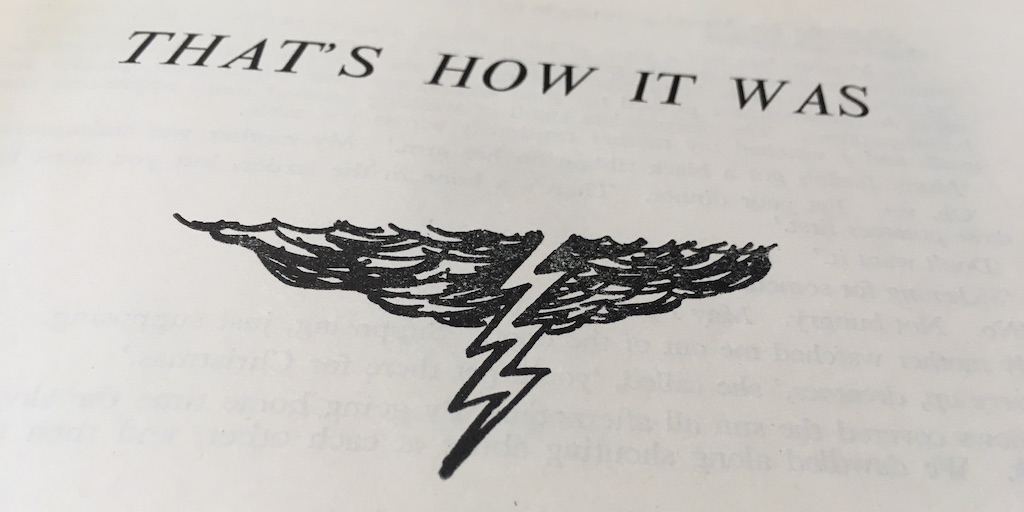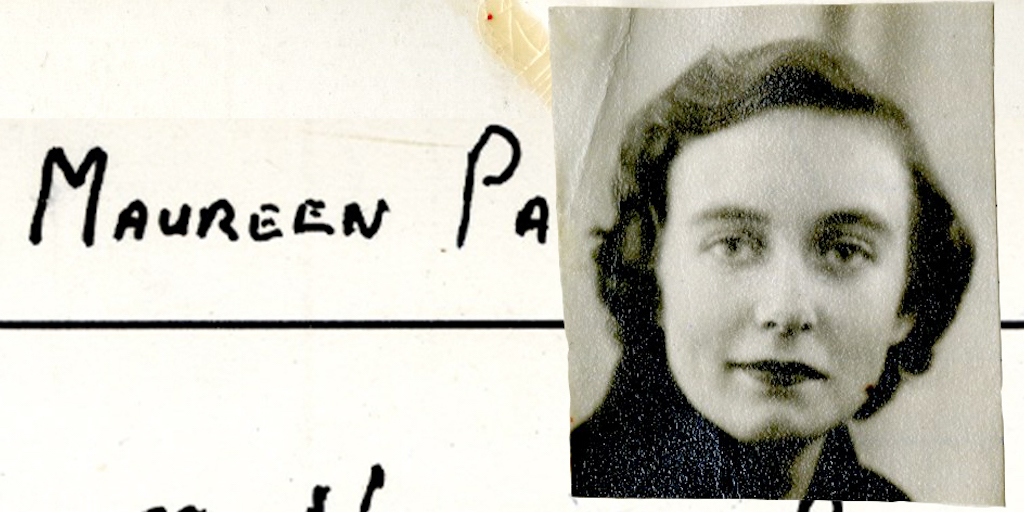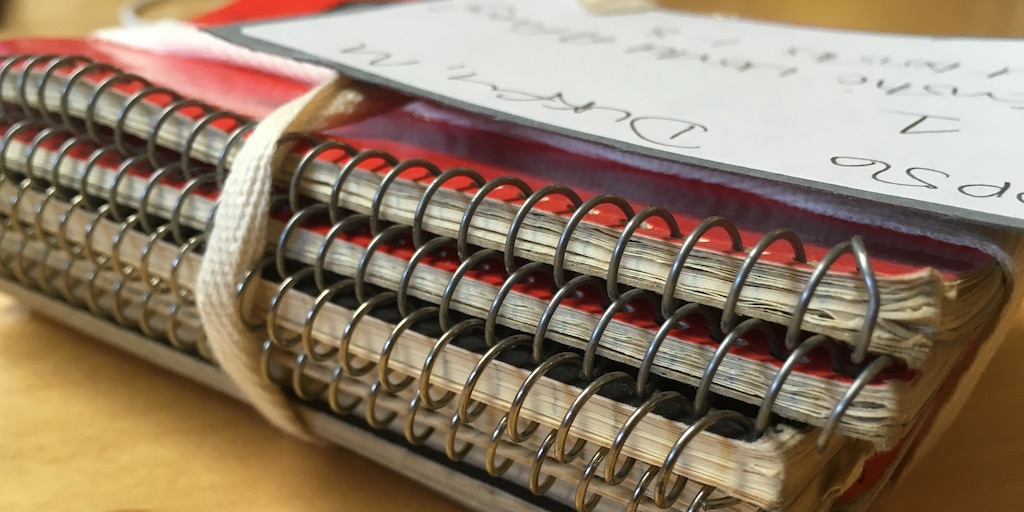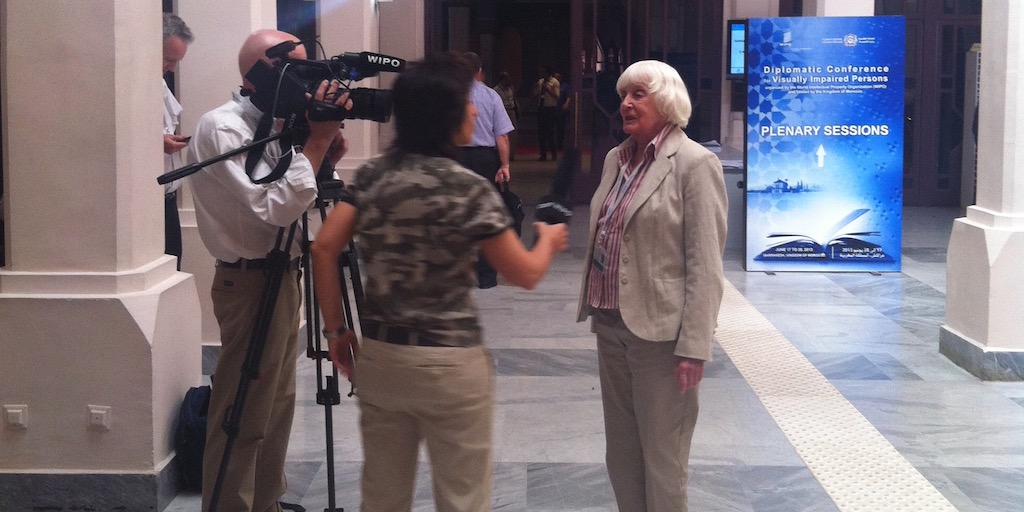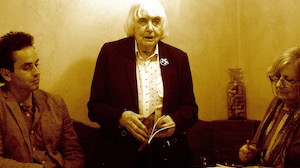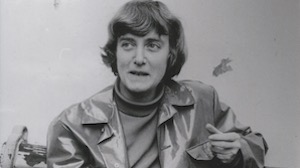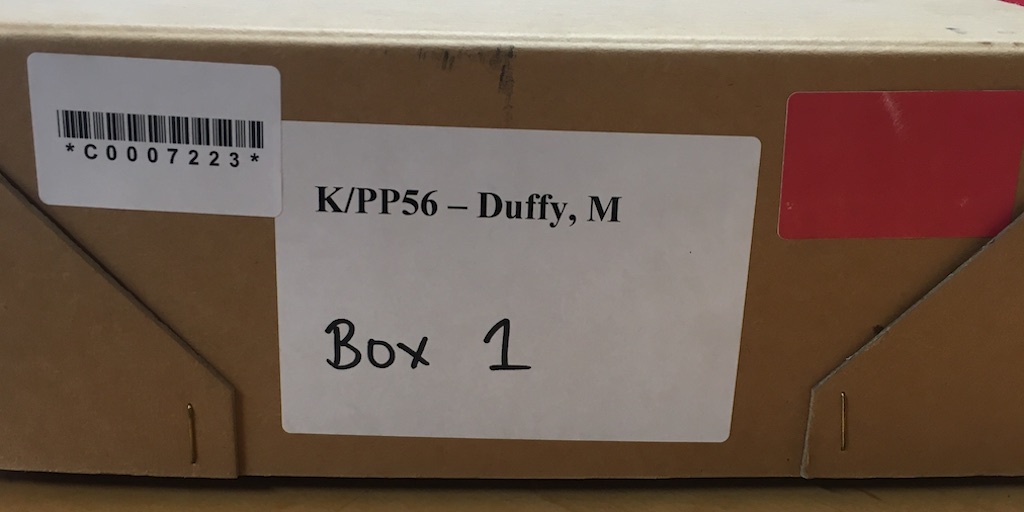Maureen Duffy at 80: In Times Like These
FIGHTING AND WRITING
Header image: Signatures and well wishes from friends and colleagues at the European Writers' Council.
Selected highlights of a many-headed relationship: Maureen Duffy and the EWC
by Lore Schultz-Wild
DEDICATED TO THE ONE AND ONLY POET & BATTLER FOR AUTHORS’ MORAL, ECONOMIC, AND HUMAN RIGHTS, NOVELIST, DRAMATIST & PLR EXPERT, BIOGRAPHER & DISTINGUISHED SPEAKER, MANIFOLD PRESIDENT & SUPERFINISHER OF RESOLUTIONS & APPEALS WHO HAS MASTERED THE ART OF MAKING (SOME) PUBLIC SERVANTS AND POLITICIANS IN EUROPE FALL IN LOVE WITH THE IDEA OF SUPPORTING IN VARIOUS WAYS THAT VERY BUNCH OF SINGLE-MINDED WRITERS
1977 Origin of the European Writers’ Congress: a meeting of more or less befriended writers from Austria, Belgium, Denmark & Faroe Islands, the Federal Republic of Germany, Finland, France, Greece, Iceland, Italy, Luxembourg, the Netherlands, Norway, Portugal, Spain, Sweden, Switzerland, Turkey and the United Kingdom - with the support of the Council of Europe and the City of (West) Berlin (D)
1985 The 7th Congress, Bergneustadt/Bonn (D), adopts the first EWC Statutes. Maureen Duffy is among the seven elected Founding Members of the EWC Working Party, charged with the task of elaborating a document on Library Royalties/Public Lending Right/PLR
1989 The 9th Congress in Fribourg (CH) with guests from the USSR, Hungary and the German Democratic Republic, passes resolutions in support of Vaclav Havel, Salman Rushdie and others, welcomes the first Newsletter, elects the first EWC President Jochen Kelter as well as Treasurer Walter J. Jeffrey and confirms the Working Party of seven. Shortly thereafter the newly established EWC Copyright Committee, including expert Maureen Duffy, among other urgent tasks prepares a Questionnaire on the legal situation of writers in member countries, Proposals with regard to Domaine Public Payant/DPP and Guidelines for Secondary Rights. The International Congress “Mind & Money” on the Future of Intellectual Property & Authors’ Rights in Europe held in Bonn (D) discusses and formulates our answer to the European Commission’s Green Paper’s notion of an (as we saw it) “Authors’ Right without Authors”. Maureen Duffy, Chairperson of both the British Copyright Council and the Authors’ Licensing and Collecting Society (ALCS), is one of six speakers (“The Exploitation of Authors’ Rights in Modern Society”) and member of the small delegation delivering the final Resolution to Commissioner Martin Bangemann in Brussels.
1991 The 10th Congress in Regensburg (D) elects Maureen Duffy together with Hans Peter Bleuel as the first ever EWC Vice Presidents, plus Board members Simone Balazard, John Erik Forslund, Michael Judge and Juan Mollá. President Jochen Kelter is confirmed in office and Wolfram Glaser appointed General Secretary. Their heavy workload includes more than a dozen Hearings and meetings with members of the European Commission and Parliament, IFRRO and WIPO. The World Copyright Agreement/Berne Convention needs to be amended. The European Community’s controversial Maastricht Agreements contain an “Article on Culture” without any concrete provisions. The EC Guidelines on Rental and Lending Right are in danger of collapse. Our PLR Petition, organised at very short notice with high personal commitment of Maureen Duffy, Hans Peter Bleuel and Jochen Kelter, is signed by an impressive list of prominent writers from the 12 Member States plus Austria and delivered to the Members of the European Parliament.
1992 The 11th Congress in the course of 15 years, held in Madrid (E), unanimously votes President, Vice Presidents and Board members back into office. On their agenda: PLR and the expansion of public libraries, Guidelines on Secondary Rights and provisions for the control of electronic copying, as well as Domaine Public Payant, Article XV (on culture) of the Maastricht Treaty, and talks with the Federation of European Publishers/FEP. An EC Hearing on Droit Moral and Intellectual Property offers the opportunity to emphasise the need to harmonise throughout Europe authors’ inviolable, inalienable and perpetual rights.
1993 The 12th Congress, held in Bath (UK), notes with deep concern the continued threat not only to fundamental human rights such as freedom of expression but also to the lives of writers, translators and publishers (Salman Rushdie, former Yugoslavia) and calls for decisive intervention by national governments to oppose xenophobia, racism and chauvinism.
1994 The first of a series of “Baltic Seminars'' in Riga (LV), also the first appearance of the new General Secretary, Lore Schultz-Wild, offering practical assistance and information on Copyright and Related Questions (including of course Maureen Duffy’s favourite baby PLR) to writers in former communist countries. It will be followed in the years to come by meetings in Lithuania and Tallinn (EE), home of Board member Mati Sirkel. After the establishment of an “Authors’ Coalition'' within IFRRO (consisting of EWC, International Federation of Journalists/IFJ, Authors’ Guild of America and Textbook Authors’ Association/TAA in the US) and the agreement of a Joint Statement on the Electronic Use of Copyright Works with IFRRO, Maureen Duffy and Trond Andreassen at a special meeting in London highlight the particular interests of the EWC in the area of Electronic Publishing. The 13th Congress, staged under the midnight sun in Tromsoe (N), makes 55 delegates work almost untiringly and sleep only very little. Among the resolutions passed one is calling on the European Union to accept Irish as an official working language. Two more call on the Member States to make legal provision for free access to printed works in public libraries and to give scriptwriters equal status with directors as creators and copyright owners of audio-visual works. Vigorous discussion of the submitted proposal outlining and justifying the concept of DPP as “Authors’ Communal Right/ACR” leads to approval as a basis for further development and strategy. The after-Congress excursion to Karasjok, capital of the Norwegian Sami people, finally provides for a meeting between Maureen Duffy, EWC Vice President, and Atukwei Okai from Accra, Ghana, General Secretary of the Pan African Writers’ Association/PAWA. A Hearing organised by the European Commission’s DG XV on “Aspects of Copyright and Related Rights on the Information Infrastructure Superhighways” makes proof of the urgent necessity to organise the 1st European Copyright Conference: “Culture and Rights – The Protection of Creativity in Europe”. In co-operation with the International Copyright Society/InterGU, the European Federation of Journalists/EFJ, the Catalan EWC member organisation AELC, the Spanish Ministry of Culture as well as the Catalan Government, and sponsored by international, national and local authorities the EWC hosts in Barcelona writers, audio-visual authors, journalists, visual artists, composers and legal experts, who finally adopt “The Barcelona Resolution” in five languages. The list of speakers and contributing participants is impressive, including Tarja Koskinen-Olsson, Ferdinand Melichar, Jean-Loup Tournier, Jürgen Becker, Gerhard Pfennig, Hermann Cohen Jehoram, Luis Gordillo – Maureen Duffy speaks up under the headline “Cassandra in Captivity: Moral Rights and the European Author”. The small delegation, headed by Maureen Duffy, elected to present the Resolution in Brussels, has to wait for more than half a year before being received by Commissioner Mario Monti.
1995 On the occasion of and following the European Parliament’s ”Forum on Books and Reading” in Strasbourg, European book publishers/FEP, represented by General Secretary Mechthild von Alemann, and authors/EWC join forces, given the alarming spread of uncontrollable and gratuitous use of authors’ intellectual property or, to put it differently, the digital exploitation of protected works by global service-providers and business interests. Maureen Duffy also approaches the European representatives of booksellers/EBF and librarians/EBLIDA, but both the end of the Net Book Agreement in Britain and the ambitions of public libraries everywhere to acquire digital use of copyright protected works without any payment to authors indicate that caution is advisable. The 80 delegates participating in the 14th Congress in Vienna, thanks to Gerhard Ruiss and Brigitte Rapp, among other things enjoy Heurigen wine and Philharmonic music in a typical orchard, but they also discuss and unanimously adopt the “Guidelines for the Licensing of Translation Rights”, developed by Gordon Fielden, as well as the resolution on “Authors’ Rights in the Digital Era”, drawn up by John Erik Forslund.
1996 The Budapest Seminar “Writers, Books and Reading after Five Years of Market Economy” – a landmark event supported by cultural institutions in Austria, Switzerland and Norway, mainly organised by Katalin Budai at the local level and getting together some forty participants from Poland, Slovenia, Romania, Estonia, Bulgaria, the Czech Republic and of course Hungary joining forces with the EWC representatives – had to do without the presence and contributions of Maureen Duffy for once. At the EU Conference on “Copyright and Related Rights on the Threshold of the 21st Century”, however, she delivers one of the opening addresses in Florence. Together with Hans Peter Bleuel she gets the impression that the Commission actually favours the involvement of collecting societies in the administration of private copying rights as well as droit de suite for visual artists. The following EU/DG XV Conference in Stockholm, however, entitled “Access to Public Information – A Key to Commercial Growth and Electronic Democracy” shows that the EC’s priorities in favour of manufacturers and other exploiters of authors’ rights haven’t changed. John Erik Forslund coins our claim to be put forward in the years to come: “An unalienable right to equitable remuneration”. The 2nd European Conference of Creators’ Organisations, “Authors’ Rights and their Management in the Information Society”, takes place near Dublin under the auspices of the Irish Government and EU Presidency. Among the keynote papers presented are two by Jörg Reinbothe, Head of Unit at DG XV of the European Commission, one dealing with Individual, Central and Collective Licensing and the other with a Communication on Copyright and Related Rights, that has been adopted by the European Commission just six days before. Its ambitious aim is “ ... to achieve a pan-EC level playing field for copyright protection in the framework of the European Single Market”. In the final resolution writers, (audio) visual artists, composers and journalists argue forcefully for the central management of authors’ rights in the digital domain by their collecting societies and call again for the heralded EU Directives covering private copying and reprography rights, moral rights and droit de suite. Again Maureen Duffy is Speaker of the delegation elected to present the Dublin Resolution – in English, Gaelic, French and German – to the protagonists of the European Commission: President Jacques Santer and Commissioners Mario Monti and Martin Bangemann. For the 15th Congress, perfectly organised in Athens under the leadership of Anastassis Vistonitis, 80 delegates from 38 member organisations can be welcomed, together with observers from Slovenia, Poland and Romania and a guest representative from the Union of Russian Writers, Moscow. A “European Watching Group on Poetry” is set up, Jochen Kelter’s resolution advocating the maintenance of fixed retail prices on books is passed unanimously and the “Olympia Resolution” on Cultural Self-Determination is publicly declaimed on the occasion of our visit at the very historic spot.
1997 Thanks to Maureen Duffy’s staunch efforts over many years (meetings, letters, reminders, notes, interventions, insistent encouragement and so on) and the commitment of Members of the EP Committee on Culture a financial subsidy of 50 000 ECU for the EWC has been earmarked in the EU Budget – a very welcome, long hoped-for step towards easing our precarious financial situation, but difficult and demanding because of administrative requirements and red-tapism. The first Round Table on Poetry in Europe, invited to Helsinki (FIN), attracts 29 poets from 22 countries for discussions about translation, promotion and publication of poetry in a foreign language. At a meeting of the CISAC “Authors’ Alliance” with Commissioner Mario Monti in Brussels Maureen Duffy takes the floor on behalf of the EWC. Acronyms such as MAI, NTM or TEP, followed a little later by NTFTM and TBC, all stand for the more or less furtive, unflagging worldwide assaults by powerful enterprises and investors on TRIPS, the guaranteed protection of authors’ rights within GATT. The French language can put it bluntly: MAI|AMI – a dangerous friend. Maureen Duffy and Hans Peter Bleuel are among the protagonists of the IFRRO Creators’ Forum formulating objections and vigorous protest.
1998 EU Commissioner Karel van Miert’s proposal to abolish cross-border retail price maintenance on books is the topic of the year. A preceding declaration, public discussion, and Resolution at the Paris “Salon du Livre”, critical statements on the occasion of Hearings at the EU Commission and Parliament in Brussels and a joint statement of European Writers and Publishers issued in London all show Maureen Duffy’s cooperation. Special efforts concerning the German-speaking areas are initiated by Jochen Kelter, Fred Breinersdorfer, Sabine Herholz and Gerhard Ruiss and culminate in a DG IV Hearing. The EWC case against Commissioner van Miert’s culturally harmful intentions is again presented by the EWC President at a follow-up meeting arranged by Mechthild von Alemann, FEP General Secretary, with members of the Legal and Cultural Committees of the EP. At the EU Conference on “Creativity and Intellectual Property Rights” in Vienna, Maureen Duffy is one of the Panel Speakers. A wide range of authors’ organisations (representing writers, visual artists, composers, musicians, directors, journalists, producers and IFRRO) gather for the first “Creators’ Forum”, mainly organised by Brigitte Rapp at the Vienna Literaturhaus and affording the kick-off for a better exchange of information and collective lobbying. In the framework of “Stockholm, European Cultural Capital 1998”, financially supported by Nordic and Swedish cultural institutions as well as (thanks to Maureen’s convincing efforts) DGX of the European Commission, the 16th European Writers’ Congress also stages a Public Forum on “The Situation of the Book in Europe” – backed by a survey of comparative data gathered from 20 countries by John Erik Forslund. Maureen Duffy has drafted a submission against the continuing delay in harmonising authors’ rights in Europe, against the plans of the European Broadcasting Union to classify existing records as “archive material” in order to exempt them from any further payments to authors, and against the claim of libraries and educational institutions to have their digital use of protected works be regulated under the US “fair use” scheme. In addition to these economic threats authors’ moral rights (paternity, authenticity) are heavily violated by digital use and distribution. The unanimous adoption of the Resolution on Authors’ Moral Rights, calling for a comprehensive statutory protection, is addressed to the European Parliament and Commission, to the Council of Ministers, WIPO and all national governments. The detailed “Authors’ Communal Rights/ACR” report by copyright expert Adolf Dietz and the plan to develop this into a European framework model for an Inter-Generational Solidarity Pact meets with general approval.
1999 Accordingly, our project PHOENIX is launched to span several years, mainly involving the British ALCS, ALIS from Sweden, ACE from Spain, the German Media Union, the Literary Translators’ Association in Austria, the Finnish Writers’ and Polish Authors’ Associations, in order to create that economic revolving system to the benefit of culture, as discussed within the EWC since 1980. Unfortunately, it will never really reach the light of European politico-cultural attention, due to a grotesque change of approach to the “cultural” Article 128 (Maastricht)/151 (Amsterdam) of the EU Treaties. In spite of all obstacles, the EWC’s next cultural conference labeled “Forum Europa II/Mare Nostrum I” can take place in Delphi thanks to Anastassis Vistonitis who succeeds in securing the generous financial support of the Greek Ministry of Culture. Special guest: Mercedes Echerer, MEP The Greens. Maureen Duffy gives a speech on “The Barbarians”: as pensive as poetic as rousing. The Delphi Resolution, elaborated under the guidance of Maureen Duffy and Gordon Fielden, clearly distinguishes between cultural policy and other political tasks such as education, media relations or the promotion of tourism; defines current creativity as complementing cultural heritage; asks for an overarching European cultural policy based on “diversity in unity” and supporting European integration. In addition, there are polite yet decided demands for a review of the Rental and Lending Directive, special attention for literary translation in multilingual Europe, and support of the French proposal of an “exception culturelle” in all future World Trade Negotiations.
2000 The 3rd European Conference of Creators’ Organisations “Authors’ Rights and their Management in Europe” aims at communicating creators’ views to both MEPs and representatives of the European Commission and therefore takes place in Strasbourg, under the patronage of the French Presidency of the European Union. Maureen Duffy and Jochen Kelter can welcome among the 77 participants more legal experts than ever before. The Strasbourg Resolution covers all relevant issues and in particular points out that users’ desire for a maximum of access to protected works, combined with appropriate conditions of use and remuneration for creators, can best be handled by their already existing collecting societies. EU Parliamentarians show little interest, with the exception of Mercedes Echerer and Willi Rothley.
2001 As the representative of authors designated by the Authors’ Coalition within IFRRO Associate Members Maureen Duffy takes part in the Cape Town, S.A. AGM. The EWC’s second Mediterranean Forum Mare Nostrum II can be hosted in Barcelona with the support of the European Commission, the Spanish collecting society CEDRO and national regional and local authorities. The four sections of the Barcelona Appeal are addressed to the three competent European bodies plus the governments of EU Member States and Associated Countries. It draws attention to various detrimental shortcomings considering the implementation of the Directive on Harmonisation of Certain Aspects of Copyright and Related Rights in the Information Society. It asks for the additional harmonisation of Authors’ Contractual Rights throughout the European Union by standardising authors’ moral rights and preventing buy-out contracts. The Appeal asks for a Directive on the administration and collection of payments for authors’ electronic rights and finally urges for Europe-wide independent research on the social and economic conditions for creative artists.
2002 Forum Europa III under the headline “Literature Today and Tomorrow”, very successfully organised in Budapest, Hungary, by Katalin Budai and Anna Menyhért, not only celebrates the first 25 years of the EWC and its 51 member organisations in 28 countries. In four sections the future of literature is under scrutiny. Writers in the Electronic Age: Access denied? – Literature and Authors’ Rights: At the Mercy of Free Market Economy? – Books and Readers: Pillars of a Civil Society? – Identity in Diversity: Challenges to Cultural Policies for Europe. Guest speakers include André Schiffrin/USA, author and director of “The New Press – Publishers in the Public Interest”, and librarian Jef van Gool/NL. Maureen Duffy circumspiciously moderates the Authors’ Rights session with Jörg Reinbothe/EU Commission, Internal Market, Ferdinand Melichar/IFRRO, Adolf Dietz/Max Planck Institute for Intellectual Property, Alain Absire/SGDL president and Péter Gyertyánffy/ArtisJus. Adolf Dietz, “godfather” of the EWC’s stillborn baby Authors’ Communal Right/ACR, presents and specifies with special attention to terminological subtleties and sensibilities “The Five Pillars of Modern European Copyright (Authors’ Rights) Protection”: Substantive copyright (authors’ rights) law, neighbouring or related rights, copyright contract law, collecting societies law and enforcement of copyright.
2003 Under the Greek Presidency of the EU more than 150 key actors in the European book industry (authors, translators, publishers, booksellers, librarians) and representatives of ministries and institutions involved in the book sector take part in the Conference “What Future for European Books? – Books and the Book Market in the Enlarged European Union”. As a Fellow of the Royal Society of Literature and Vice President of the EWC Maureen Duffy opens and shapes Workshop 1 under the question: What is a book today? Her answer “towards a contemporary definition of books” spans a remarkable arch from the etymological backgrounds via various technologies (all suitable to carry thoughts and creations from author to reader) to the concept of integrity of text, i.e continental droit moral/authors’ rights. The 18th Congress in Fribourg/CH, having to say goodbye to Board members Jochen Kelter, John Erik Forslund and Arie van den Berg, elects the new President Maureen Duffy plus Vice Presidents Hans Peter Bleuel/D and Anastassis Vistonitis/GR together with regular Members of the Board Adi Blum/CH, Marcella Dallatorre/I, Monika Fagerholm/FIN and Anna Menyhért/HU. Members of the next Election Committee: Merete Jensen (FIN), Katalin Budai (HU) & Ragnheidur Tryggvadottir/Iceland. On the agenda for discussion is CC – Creative Commons, the new way of licensing the use of intellectual property individually, outside the framework of collecting societies and traditional copyright.
2004 The EWC on behalf of the Creators’ Forum, the representatives of creators covering all media throughout the European Union, organises a Mini Conference in Brussels in urgent defense of Art. 151 of the Amsterdam Treaty and hoping for a numerous audience from EP Committees and EC DGs in the wake of the accession of the EU candidate countries – in vain. Maureen Duffy in her opening speech evokes “a real opportunity to relaunch ourselves globally in all our diversity – but only if our legislators are prepared to take up the challenge of providing European creators with the just laws that can ensure a just return.” Under the Irish Presidency of the EU an international conference is held in Dublin, featuring “Copyright for Creativity in the Enlarged European Union: profile – perception – awareness”. EWC President Maureen Duffy insists on the inviolability of the author’s right as the basis of creativity and the purpose of the aquis communautaire of “honouring the also basic concept that the strength, both moral and economic, of the European Union lies in its creative diversity”. At an IFRRO Workshop on Reproduction Rights for RRO’s, authors’ and publishers’ representatives from the new EU Member States, Maureen Duffy speaks on the necessity of authors’ involvement in their Reproduction Rights Organisations. “We are all caught up in a technological revolution whose outcome we cannot foresee. We shall sink or swim together and with us the centuries-old European literary culture.” The EWC’s Mare Nostrum III conference, hosted in Nicosia, Cyprus and entitled “The Mediterranean: Dividing Waters or Common Ground?” deals with the role of literature and writers in a world in conflict, particularly in the Eastern Mediterranean. On the divided island, historic meeting point of the cultures, faiths and aspirations of Europe, EWC President Maureen Duffy together with Christos Hadjipapas/Union of Cypriot Writers and EWC Vice President Anastassis Vistonitis/GR can welcome at that singular event prominent authors such as Salwa Bakr/Egypt, Niki Marangou/Greece, Cengiz Bektas/ Turkey, Yael Lerer/Israel together with numerous members of both the Turkish and Greek writers’ communities on Cyprus for the very first time. Together they deplore the resurgence of intolerance and xenophobia throughout the world and in Europe; the Cyprus Resolution calls upon the governments and institutions of Europe to reaffirm that the EU is a consenting association of nations dedicated to tolerance, freedom of speech and expression, and that the pen must be ‘mightier than the sword’.
2005 Again, Maureen Duffy can act as our financial guardian angel in securing an interest-free loan from the ALCS in order to bridge the difficult time until the payment of 80% of the EU grant for the running of the EWC in 2005 will reach our account. In order to secure the financial survival and the multi-layered range of tasks and projects in the long run, several meetings with Trond Andreassen/N and Olav Stokkmo/IFRRO take place. A fundamental decision concerning the future course and character of the EWC seems inevitable: either focussing purely on authors’ rights with substantial support from Kopinor and the Nordic Council for three years or precarity as usual while maintaining the traditional creative mixture of battling for authors’ moral, economic and human rights in combination with initiatives for both shaping cultural policies in Europe and fostering literary life as well as the impact of EWC member organisations. In the EWC Newsletter 2005-3 Gordon Fielden gives the thoughtful and encouraging kick-off contribution to the necessary deliberations and decisions ahead. The 19th European Writers’ Congress is perfectly organised in Amsterdam by Annechien Visser, Wim Jurg & Arie van den Berg and happily coincides with the Dutch Writers’ Guild/VvL Centennial. 70 delegates from 25 countries (representing the total of about 55 000 writers and literary translators) and several guests have come to bid a cordial farewell to the two EWC Managing Board members of the longest standing: Maureen Duffy and Hans Peter Bleuel. They listen to keynote speeches by Frédéric Young/SACD-Scam (Collective Commons) and Bernt Hugenholtz/Ivir, NL (Copyright Contract Law) and discuss EWC perspectives presented by Olav Stokkmo (EWC role within IFRRO), Adi Blum & Graham Lester George (re-launch of the web site and Authors’ Rights Awareness Campaign), and Anna Menyhért (2004 inquiry on members’ needs and expectations). Special attention is given to support for Turkish author Orhan Pamuk. Our guest from Belarus, poet Andrej Khadanovich, with lively miniatures draws attention to the exasperating situation of intellectuals in his home country (“Dealers in Air”).
Mauren Duffy gives her last speech as EWC President (after a total of 14 years on the Board), inspiring and convincing as ever with her creative arguments for the benefit of authors in Europe and beyond. She warns that the growing threats from a dominant global ethos of unfettered market economy will certainly not go away if we try to ignore them, but result in a dangerous homogenisation of culture, languages and literatures: “We must change our tactics and our strategy to deal with it!”
2006 The 3rd European Seminar on PLR takes place in Madrid. Trond Andreassen, Maureen Duffy’s successor as EWC President, continues the sincere involvement; Katalin Budai and other Hungarian delegates are asked to find out about the chances to organise the 4th such event in Budapest the following year. In the EWC Submission concerning the EC Communication on the i2010 Digital Libraries Project the claim is made that “If our works are digitised and made freely accessible, we are just as entitled to a version of PLR as if physical copies are made available ...” And the Commission is urged “to once again look into the question of introducing a special form of Domaine Public Payant: Authors’ Communal Right, if there is to be a massive digitisation of work in the public domain.” The 4th European Conference of Creators’ Organisations on “Authors’ Rights and the European Agenda 2007-2013” under the Finnish Presidency and with representative speakers from the four relevant Directorates General in Brussels deals with “Competitiveness & Digital Challenges, Collective Action & Cultural Diversity”, i.e. the full range of our issues. Internationally well-renowned keynote speakers include Jukka Liedes, Josef Drexl, André Lucas, Tarja Koskinen-Olsson and as guest of honour Belgian author Eric-Emmanuel Schmitt (“L’écrivain – le droit – l’argent”).
For the last time this kind of conference is organised by the European Writers’ Congress and EWC ex-President Maureen Duffy in her intervention sends the participants (both European public servants and creators of all kinds) off to further cooperative battling for example with the question: “In a digitised world of literature, what happens to the notion of ‘out of print’ – how can I secure and deal with my rights if my work is no longer on the market but still exists in the drawers of the publisher as a forgotten file?”
Sections and Chapters
Duffy and King's introduction
Katie Webb
Finding Maureen Duffy in the Archives
Patricia Methven
King's in Maureen Duffy's time
Christine Kenyon Jones
Kings, and Queens, Histories in Fact and Fiction
Clare A. Lees
Panel Summary: the city as a space for new possibilities
Phoebe Blatton
Writing, Rites, and Rights
John Stokes
A Window for Maureen Duffy
Clare Brant
Fighting and Writing introduction
Katie Webb
Duffy and the European Writers' Congress
Lore Schultz-Wild
An 80th Birthday Honorific Speech
Ingrid Protze
Memories of the German Writers' Union
Sabine Herholz
On Maureen
Katalin Budai
A copyright warrior and a true defender of rights
Olav Stokkmo
Recognising writers: responses, records, royalties
Katie Webb
Maureen Duffy's contribution to gay rights and lesbian visibility
Jill Gardiner
For Maureen Duffy, Poiêtes
Karen Gevirtz
Editor's introduction
Katie Webb
Maureen Duffy: Scrivener and Prophet
Charles Lock
Words that count: Maureen Duffy
Marina Warner
Browse articles on Fighting and Writing
